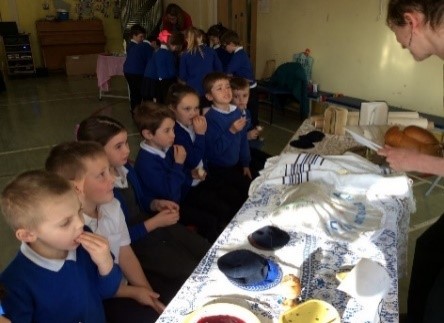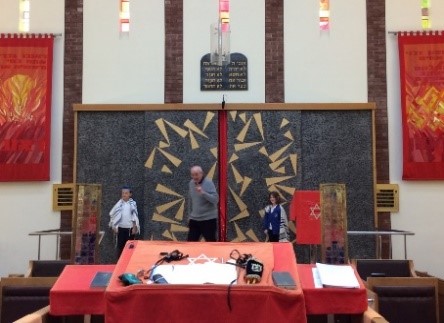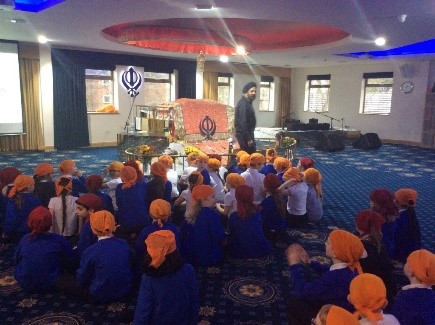Learning Intention
“In Religion, Values and Beliefs, you explore, consider and respect a range of religions, world views and ideas which empower you to form personal opinions and values that transform into an identity; enabling you to find your place in our amazing, diverse and pluralistic world.” Miss Gill, RE Leader
While exploring and learning about Religion, Values and Beliefs, children learn to identify the connectivity between their own experiences and those of others; empowering them to have a deep understanding of the world around them. The curriculum contributes dynamically to children’s experiences as we believe that it is vital for all our children to learn from, and about religion. This enables them to develop their knowledge of the world faiths, and become innately curious of the beliefs, values and traditions of other individuals, societies, communities and cultures. While exploring the Key Questions, children consider challenging questions about meaning and purpose in life, beliefs about Gods, ultimate reality issues of right and wrong and reflect on their own beliefs, values and experiences throughout. They learn to develop and express their insights with compassion, and agree or disagree respectfully; ultimately enabling them to develop their own ideas, values and identities. By promoting tolerance and understanding of other people, our children create a Lasting Legacy by appreciating and confidently articulating what it means to be positive members of our pluralistic society.
Aims
- To enable children to recognise the diversity which exists within and between communities.
- To support children to investigate and thoughtfully respond to key questions posed.
- To encourage learners to explore their own ideas and questions.
- To enable learners to respond creatively when investigating key concepts and questions.
- To develop children’s oracy so they can engage in meaningful discussions and debate.
- To articulate their own beliefs, values and commitments and equally value others.
Learning Journey
The Religious Education Leader has a strong understanding of the EYFS curriculum, and the seven areas of learning and development that shape the educational programmes in our Early Years Foundation Stage. All areas of learning and development are important and inter-connected, and the experiences, opportunities and activities which are planned enable children to develop a broad range of knowledge and skills that provide the right foundations for good future progress through school and life. As children move into Key Stage 1 and Key Stage 2, Religious Education is planned, for Years 1 to 6, using the RE progressive skills, knowledge and vocabulary maps which enable teachers to ensure they are always planning for the next steps in learning around any of the key questions posed. RE at Meadowbank enables children to explore questions through discovery, exploration and connectivity. They learn how individuals, communities and religious groups believe, live and express their ideas, morals and values and respond articulately and respectfully to these. Knowledge and skills are then further enhanced through discussion and explorations, rich in practical and experiential opportunities. It is the role of the adults to facilitate learning at every occasion and children are provided with the opportunity to become Leaders of Change by asking their own questions, sharing their own ideas and values and understanding their contribution to their own and other’s communities.
Learning Environment and Immersion
To ensure our young children become Life-Long Learners we plan and provide a rich and meaningful environment that enables every child to explore their own and other’s values and beliefs. Children are equipped to explore key vocabulary, big questions and key concepts by, for example, exploring and understanding religious artefacts, reading high quality texts and by visiting places of worship in the local and wider community thus ensuring learners understand and conceptualise the purpose and reason for Religion, Values and Beliefs beyond the classroom. In order to engage children’s curiosity; a range of stimulus linked to the key question encourage oracy through discussion, debate and discovery; facilitated using the philosophy for children structure; ensuring our children can appreciate and articulate their role in our pluralistic society.
Assessment for Learning
Assessment of RE is evidenced through the use of the RE progression of skill, knowledge and vocabulary maps and each year group’s curriculum journals; which clearly outline the key question to be explored each half term. This is used to inform planning and map coverage across the year and also includes the children’s questions, interests and experiences. This sequence of learning is then captured through a range of assessment opportunities and personalised short-term planning ensures that teachers plan for children to demonstrate their understanding in a range of ways and ensure that this enables them to show their knowledge and skills to the best of their ability. This is facilitated in a range of contexts including role-play, cross curricular writing and reading, drama and discussion and debate supported through philosophy for children. Feedback is given verbally during each lesson so that each child can make progress towards meeting and exceeding the outcomes for the key question
Monitoring and review
The RE leader is responsible for the rigorous monitoring of the subject through book and planning looks, pupil voice, lesson pop ins and whole school CPE. Ongoing analysis of outcomes enables the RE leader to identify vulnerable groups of children across school and support staff in enabling children within these groups to accelerate progress. Feedback to staff then informs next steps in monitoring and support so that there can be personalised and effective JPD planned to address areas for development. Our children are involved in this monitoring process in a number of ways across the academic year. Children are empowered to talk about their learning through the curriculum journals and their own year-group books during pupil voice opportunities. Our children can talk about their prior learning and how it connects to other areas of the curriculum and wider world.
Legal Requirements of RE
RE must be provided for all registered pupils in state-funded schools in England, including state-funded academies, unless withdrawn by their parents. It is a necessary part of a ‘broad and balanced curriculum’. A locally agreed syllabus is a statutory syllabus for RE recommended by an Agreed Syllabus Conference for adoption by a local authority. The RE curriculum drawn up by a SACRE ‘shall reflect the fact that the religious traditions in Great Britain are in the main Christian, while taking account of the teaching and practices of the other principal religions represented in Great Britain’. As education policy changes, the legal requirement for RE for all registered pupils remains unchanged. RE is an entitlement for all pupils, unless they have been withdrawn by their parents from some or all of the RE curriculum.
Right of withdrawal
This was first granted when RE was actually religious instruction and carried with it connotations of induction into the Christian faith. RE is very different now – open, broad, exploring a range of religious and non-religious worldviews. However, in the UK, parents still have the right to withdraw their children from RE on the grounds that they wish to provide their own religious education. (School Standards and Framework Act 1998 S71(3)). This will be the parents’ responsibility. However, at Meadowbank, because we believe that RE offers such a broad and balanced curriculum to its pupils, we would engage in many discussions with parents to ensure that they understand the aims and value of RE before honouring this right.



